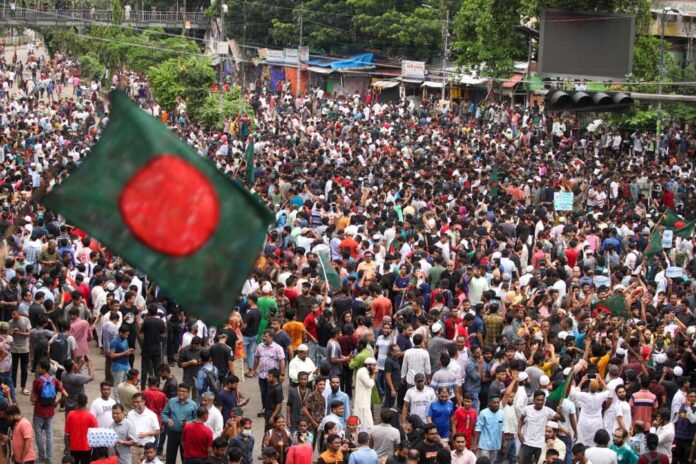
Bangladesh has been in the news for the past few weeks for its unprecedented Gen Z student-led revolution which resulted in the overthrow of long-time serving Prime Minister Sheikh Hasina and her ruling party. This has created huge concerns in India and been described as failure of India’s foreign policy and intelligence.
Sheikh Hasina, who first came into power in a legitimate election 14 years ago gradually became authoritative and manipulated subsequent elections to ensure her grip over every institution of power – from administrative to judiciary. India, the largest democracy in the world, maintained strict silence about her autocratic policies. Instead, publicly expressed partisan support for her and her political party.
To be sure, India directly benefited from her policies. Unlike previous leaders of Bangladesh, Hasina did not protest strongly about sharing of water from upstream rivers in India. India got road access to her remotest eastern parts without paying any tolls. Indian skilled personnel got jobs (sometimes at the expense of locals) in Bangladesh. India became Bangladesh’s largest foreign supplier of energy by obstructing Bangladesh’s ability to access and buy from cheaper sources like Nepal. India also became the preferred source for all the government contracts.
To ensure continuance of power, Sheikh Hasina openly sought and got support from Indian intelligence to control her domestic opponents. She effectively used her party controlled administrative and judiciary system to jail under false charges thousands of people including internationally respected and revered people like Nobel Laureate Professor Yunus. Hundreds of opponents were abducted, never to be heard of again. Again, India remained silent.
With erosion of democracy, accountability of those in power also went away and facilitated corruption. Powerful families (only 13 according to some reports) took over the banks, manipulated the stock markets and restricted competition to ensure mega monopoly profits. Everyone had to pay at every level – poor farmers had to pay a “syndicate” who controlled all fresh markets, bus drivers had to pay both police and ruling party functionaries to transport people and cargo, one had to “buy” jobs at all levels by paying bribes. Similar “trades” took place for everything from getting a driver’s license to transferring property rights to one’s own children.
Bangladesh’s once vigorous media and independent civil society of intellectuals were silenced through passing draconian laws and jailing and torturing people with opposing viewpoints. All credit for all positive developments were given to governing Sheikh family, who in turn were surrounded by shameless sycophants. The model of governance was clearly moving towards the North Korean one.
To be sure, economic development took place despite all the inequities. There are very few people in today’s Bangladesh who are unclothed or hungry. Giant infrastructure projects like metro rail and Padma Setu (one of the longest bridges in the world) were successfully completed. On pure administrative abilities, Sheikh Hasina earned a reputation as an able project management leader for getting this done.
Finally, it was corruption, her war on free speech, almost 30% unemployment among young college graduates and open cronyism which brought Sheikh Hasina down. The top 13 business groups owned and controlled all the wealth and businesses. Merit was completely set aside for reserved “quotas” in sought-after government jobs.
The fury and accelerating public support for the student revolution came as a surprise because people with absolute power (and power corrupted them absolutely!) operate in a world of their own. The students faced the fury of the ruling party fearlessly – facing bullets, giving their lives, and challenging the police and army to join them. Again, India remained silent while democracy was being trampled, students bring beaten and killed in every corner of Bangladesh.
Now India is looking for a policy for the future while the overthrown prime Minister sits in a “safe house” near Delhi and her cronies are planning and plotting. However, a huge propaganda war has been launched, primarily from West Bengal, that the Hindu minority in Bangladesh are being killed and mandirs are being destroyed. It is true that there have been reprisals against the Awami League members some of them happen to be Hindus. There is no evidence of large-scale communal attacks on Hindus or any other religions.
India’s policy now and in the future should not be so closely aligned with a single political party or a personality. It should support democracy and be a friend to all supporters of democratic principles. Instead of trying to dominate the economics and politics of Bangladesh, it can be magnanimous in how it treats its neighbors. The turmoil within all its neighbors (Pakistan, Sri Lanka, Nepal, Maldives and now Bangladesh) is NOT good for India. Instead, it should take the leadership in reviving SAARC – South Asian Association for Regional Cooperation. Member states include Afghanistan, Bangladesh, Bhutan, India, Maldives, Nepal, Pakistan, and Sri Lanka. SAARC should be the vehicle for India lead and promote peace, trade, and democracy among the countries in its immediate sphere of influence.

